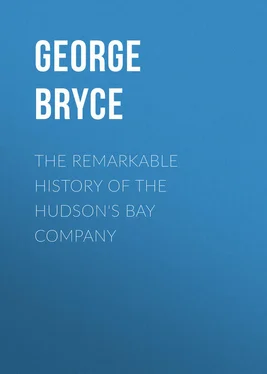George Bryce - The Remarkable History of the Hudson's Bay Company
Здесь есть возможность читать онлайн «George Bryce - The Remarkable History of the Hudson's Bay Company» — ознакомительный отрывок электронной книги совершенно бесплатно, а после прочтения отрывка купить полную версию. В некоторых случаях можно слушать аудио, скачать через торрент в формате fb2 и присутствует краткое содержание. Издательство: Иностранный паблик, Жанр: foreign_antique, foreign_prose, на английском языке. Описание произведения, (предисловие) а так же отзывы посетителей доступны на портале библиотеки ЛибКат.
- Название:The Remarkable History of the Hudson's Bay Company
- Автор:
- Издательство:Иностранный паблик
- Жанр:
- Год:неизвестен
- ISBN:нет данных
- Рейтинг книги:3 / 5. Голосов: 1
-
Избранное:Добавить в избранное
- Отзывы:
-
Ваша оценка:
- 60
- 1
- 2
- 3
- 4
- 5
The Remarkable History of the Hudson's Bay Company: краткое содержание, описание и аннотация
Предлагаем к чтению аннотацию, описание, краткое содержание или предисловие (зависит от того, что написал сам автор книги «The Remarkable History of the Hudson's Bay Company»). Если вы не нашли необходимую информацию о книге — напишите в комментариях, мы постараемся отыскать её.
The Remarkable History of the Hudson's Bay Company — читать онлайн ознакомительный отрывок
Ниже представлен текст книги, разбитый по страницам. Система сохранения места последней прочитанной страницы, позволяет с удобством читать онлайн бесплатно книгу «The Remarkable History of the Hudson's Bay Company», без необходимости каждый раз заново искать на чём Вы остановились. Поставьте закладку, и сможете в любой момент перейти на страницу, на которой закончили чтение.
Интервал:
Закладка:
After nearly three months of the most dangerous and exciting adventures, the party reached their destination. The officers and men of the Hudson's Bay Company's service were chiefly civilians unaccustomed to war, and were greatly surprised by the sudden appearance upon the Bay of their doughty antagonists. At the mouth of the Moose River one of the Hudson's Bay Company forts was situated, and here the first attack was made. It was a fort of considerable importance, having four bastions, and was manned by fourteen guns. It, however, fell before the fierce assault of the forest rangers. The chief offence in the eyes of the French was Charles Fort on the Rupert River, that being the first constructed by the English Company. This was also captured and its fortifications thrown down. At the same time that the main body were attacking Charles Fort, the brothers Le Moyne, with a handful of picked men, stealthily approached in two canoes one of the Company's vessels in the Bay and succeeded in taking it.
The largest fort on the Bay was that in the marshy region on Albany River. It was substantially built with four bastions and was provided with forty-three guns. The rapidity of movement and military skill of the French expedition completely paralyzed the Hudson's Bay Company officials and men. Governor Sargeant, though having in Albany Fort furs to the value of 50,000 crowns, after a slight resistance surrendered without the honours of war. The Hudson's Bay Company employés were given permission to return to England and in the meantime the Governor and his attendants were taken to Charlton Island and the rest of the prisoners to Moose Fort. D'Iberville afterwards took the prisoners to France, whence they came back to England.
A short time after this the Company showed its disapproval of Governor Sargeant's course in surrendering Fort Albany so readily. Thinking they could mark their disapprobation more strongly, they brought an action against Governor Sargeant in the courts to recover 20,000 l. After the suit had gone some distance, they agreed to refer the matter to arbitration, and the case was ended by the Company having to pay to the Governor 350 l. The affair, being a family quarrel, caused some amusement to the public.
The only place of importance now remaining to the English on Hudson Bay was Port Nelson, which was near the French Fort Bourbon. D'Iberville, utilizing the vessel he had captured on the Bay, went back to Quebec in the autumn of 1687 with the rich booty of furs taken at the different points.
These events having taken place at a time when the two countries, France and England, were nominally at peace, negotiations took place between the two Powers.
Late in the year 1686 a treaty of neutrality was signed, and it was hoped that peace would ensue on Hudson Bay. This does not seem to have been the case, however, and both parties blame each other for not observing the terms of the Act of Pacification. D'Iberville defended Albany Fort from a British attack in 1689, departed in that year for Quebec with a ship-load of furs, and returned to Hudson Bay in the following year. During the war which grew out of the Revolution, Albany Fort changed hands again to the English, and was afterwards retaken by the French, after which a strong English force (1692) repossessed themselves of it. For some time English supremacy was maintained on the Bay, but the French merely waited their time to attack Fort Bourbon, which they regarded as in a special sense their own. In 1694 D'Iberville visited the Bay, besieged and took Fort Bourbon, and reduced the place with his two frigates. His brother De Chateauguay was killed during the siege.
In 1697 the Bay again fell into English hands, and D'Iber ville was put in command of a squadron sent out for him from France, and with this he sailed for Hudson Bay. The expedition brought unending glory to France and the young commander. Though one of his warships was crushed in the ice in the Hudson Straits and his remaining vessels could nowhere be seen when he reached the open waters of the Bay, yet he bravely sailed to Port Nelson, purposing to invest it in his one ship, the Pelican . Arrived at his station, he observed that he was shut in on the rear by three English men-of-war. His condition was desperate; he had not his full complement of men, and some of those on board were sick. His vessel had but fifty guns; the English vessels carried among them 124. The English vessels, the Hampshire , the Dering , and the Hudson's Bay , all opened fire upon him. During a hot engagement, a well-aimed broadside from the Pelican sank the Hampshire with all her sails flying, and everything on board was lost; the Hudson's Bay surrendered unconditionally, and the Dering succeeded in making her escape. After this naval duel D'Iberville's missing vessels appeared, and the commander, landing a sufficient number of men, invested and took Port Nelson. The whole of the Hudson Bay territory thus came into the possession of the French. The matter has always, however, been looked at in the light of the brilliant achievement of this scion of the Le Moynes.
Few careers have had the uninterrupted success of that of Pierre Le Moyne D'Iberville, although this fortune reached its climax in the exploit in Hudson Bay. Nine years afterwards the brilliant soldier died of yellow fever at Havana, after he had done his best in a colonization enterprise to the mouth of the Mississippi which was none too successful. Though the treaty of Ryswick, negotiated in this year of D'Iberville's triumphs, brought for the time the cessation of hostilities, yet nearly fifteen years of rivalry, and for much of the time active warfare, left their serious traces on Hudson's Bay Company affairs. A perusal of the minutes of the Hudson's Bay Company during this period gives occasional glimpses of the state of war prevailing, although it must be admitted not so vivid a picture as might have been expected. As was quite natural, the details of attacks, defences, surrenders, and parleys come to us from French sources rather than from the Company's books. That the French accounts are correct is fully substantiated by the memorials presented by the Company to the British Government, asking for recompense for losses sustained.
In 1687 a petition was prepared by the Hudson's Bay Company, and a copy of it is found in one of the letter-books of the Company. This deals to some extent with the contention of the French king, which had been lodged with the British Government, claiming priority of ownership of the regions about Hudson Bay. The arguments advanced are chiefly those to which we have already referred. The claim for compensation made upon the British Government by the Company is a revelation of how seriously the French rivalry had interfered with the progress of the fur trade. After still more serious conflict had taken place in the Bay, and the Company had come to be apprehensive for its very existence, another petition was laid before His Majesty William III., in 1694. This petition, which also contained the main facts of the claim of 1687, is so important that we give some of the details of it. It is proper to state, however, that a part of the demand is made up of what has since been known as "consequential damages," and that in consequence the matter lingered on for at least two decades.
The damages claimed were: —

CHAPTER VII
RYSWICK AND UTRECHT
The "Grand Monarque" humbled – Caught napping – The Company in peril – Glorious Utrecht – Forts restored – Damages to be considered – Commission useless.
Читать дальшеИнтервал:
Закладка:
Похожие книги на «The Remarkable History of the Hudson's Bay Company»
Представляем Вашему вниманию похожие книги на «The Remarkable History of the Hudson's Bay Company» списком для выбора. Мы отобрали схожую по названию и смыслу литературу в надежде предоставить читателям больше вариантов отыскать новые, интересные, ещё непрочитанные произведения.
Обсуждение, отзывы о книге «The Remarkable History of the Hudson's Bay Company» и просто собственные мнения читателей. Оставьте ваши комментарии, напишите, что Вы думаете о произведении, его смысле или главных героях. Укажите что конкретно понравилось, а что нет, и почему Вы так считаете.












